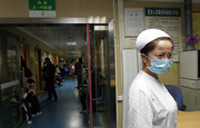An 18-year-old man beat a doctor to death with an iron bar at a hospital in Heilongjiang province on Monday because he was unhappy with the medic's treatment of his illness, police said.
|
 |
| Solve medical disputes to avoid more bloody incidents |
|
 |
| Man accused of killing doctor appears in court |
Sun Dongtao, 45, head of the ear, nose and throat department at a hospital affiliated with the State-owned Beiman Special Steel Co in Qiqihar, was attacked at 10:20 am, Xinhua News Agency reported. He died while receiving emergency care.
The suspect, surnamed Qi, is a Qiqihar resident and had recently received treatment from Sun for a nasal problem.
Police said Qi was unhappy with the treatment and wanted revenge. On Monday, he broke into the outpatients room and attacked Sun with a 50-cm-long iron bar, Xinhua reported.
The suspect was later caught by police. According to the hospital, Qi is a high school student, but police did not confirm this. Authorities did not release any other information on the suspect.
There have been frequent reports of patients attacking medical staff members in recent years in China. In 2012, a 17-year-old migrant worker killed one and injured three medical staff members at a hospital in Harbin, Heilongjiang province. He said he had visited a doctor at the hospital six times over two years for leg pain but didn't see any improvements.
"Young people are more impulsive and more reckless in all kinds of criminal cases," said Li Huijuan, a lawyer specializing in doctor-patient cases who worked on the 2012 case.
After that attack, the National Health and Family Planning Commission asked hospitals to strengthen security to protect their staff members.
"Over the past two years, 11 ministries have called for better security at hospitals, but attacks on doctors are happening constantly and security for doctors has not improved," Li said. "That is why I feel so distressed about the situation."
Hospitals are required to employ at least three security guards for every 100 patients they receive on a daily basis, but most have failed to meet this requirement.
"We find that most hospitals are doing nothing to improve security for doctors," Li said.
Deng Liqiang, director of the law department at the Chinese Medical Doctors Association, said it is very difficult to carry out security checks for every patient at a hospital.
He said that hospitals do not want to conduct security checks because there are so many patients. Deng said resources are limited at most hospitals, which are always full. In many hospitals, patients often wait in long lines for hours before seeing a doctor for just a few minutes.
Many patients have also complained about high costs of medical treatment, reportedly caused by some hospitals' overemphasis on making profits.
"As a result, doctor-patient conflicts become acute," Deng said.
"If the government wants to improve the situation, it should strengthen community hospitals and divert patients at major hospitals to smaller ones. It should also enforce security checks for all patients."
